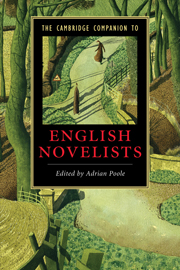Book contents
- Frontmatter
- Introduction
- 1 Daniel Defoe
- 2 Samuel Richardson
- 3 Henry Fielding
- 4 Laurence Sterne
- 5 Frances Burney
- 6 Jane Austen
- 7 Walter Scott
- 8 Charles Dickens
- 9 William Makepeace Thackeray
- 10 Charlotte Brontë
- 11 Emily Brontë
- 12 Elizabeth Gaskell
- 13 Anthony Trollope
- 14 George Eliot
- 15 Thomas Hardy
- 16 Robert Louis Stevenson
- 17 Henry James
- 18 Joseph Conrad
- 19 D. H. Lawrence
- 20 James Joyce
- 21 E. M. Forster
- 22 Virginia Woolf
- 23 Elizabeth Bowen
- 24 Henry Green
- 25 Evelyn Waugh
- 26 Graham Greene
- 27 William Golding
- Guide to further reading
- Index
7 - Walter Scott
Published online by Cambridge University Press: 28 March 2010
- Frontmatter
- Introduction
- 1 Daniel Defoe
- 2 Samuel Richardson
- 3 Henry Fielding
- 4 Laurence Sterne
- 5 Frances Burney
- 6 Jane Austen
- 7 Walter Scott
- 8 Charles Dickens
- 9 William Makepeace Thackeray
- 10 Charlotte Brontë
- 11 Emily Brontë
- 12 Elizabeth Gaskell
- 13 Anthony Trollope
- 14 George Eliot
- 15 Thomas Hardy
- 16 Robert Louis Stevenson
- 17 Henry James
- 18 Joseph Conrad
- 19 D. H. Lawrence
- 20 James Joyce
- 21 E. M. Forster
- 22 Virginia Woolf
- 23 Elizabeth Bowen
- 24 Henry Green
- 25 Evelyn Waugh
- 26 Graham Greene
- 27 William Golding
- Guide to further reading
- Index
Summary
In The Great Tradition, F. R. Leavis famously dismisses the fiction of Walter Scott (1771-1832), arguing in a footnote that while he was 'a great and very intelligent man' he did not have 'the creative writer's interest in literature' and 'made no serious attempt to work out his own form and break away from the bad tradition of the eighteenth-century romance'. 'Out of Scott', he concludes, 'a bad tradition came.' Leavis's dismissal of Scott, whose influence had been extraordinary, sets the tone for much of twentieth-century criticism. It did not in itself destroy Scott's literary reputation, but it encapsulated a negative response that was typical of the modernist period. Certainly, there is a sense in which Scott's long, usually three-volume, novels were antithetical to modernist aesthetics. Scott's primary interest is not with the inner life, and as such he was of little interest to the modernists, who shifted the locus of fiction from the exterior to the interior. Concomitantly, while writers such as Virginia Woolf concentrate on the precise details of psychological nuance and prose style, Scott is a master of what Franco Moretti has recently called the 'filler', those acts of narration which exist between and beyond the 'essential' detail, and much of the interest of his fiction lies within the significances of such 'excess' material. Woolf herself, consequently, while recognising Scott's talent for what she wryly calls 'illumination' nevertheless sees his work as essentially limited, arguing that 'he has entirely ceased to influence others'. Even within Scotland, writers working within the broad parameters of modernist concerns were dismissive of Scott, suggesting that his work was a failure not only in aesthetic terms, but that that failure was symptomatic of Scotland's failure as a nation in postunion Britain.
- Type
- Chapter
- Information
- The Cambridge Companion to English Novelists , pp. 116 - 131Publisher: Cambridge University PressPrint publication year: 2009



